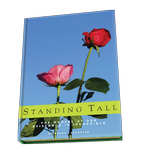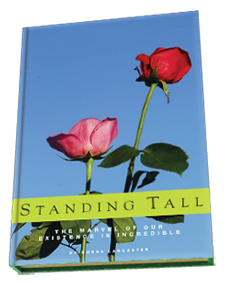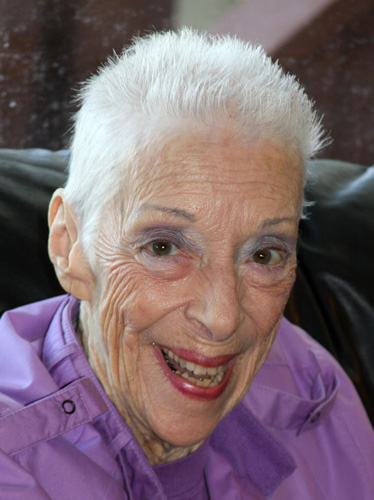WHAT’S GOING ON?
#153 APRIL 2007
ALONG THE WAY
Without agape we are dead. Agape allows us to pass from death to Life.
THIS MONTHS THOUGHT
Procrastination is self-inflicted punishment.
SCIENCE OF MAN (Lesson Ten)
There is a Teaching idea that would be very worthwhile to make a note of and to observe for a while. This idea is: That only as I, the observer, sees some idea of the self, of John or Mary, as an illusion, is it free of the tendency to identify with that idea. We will repeat this. There is a Teaching idea that only as I, the observer, sees some idea of the self, of John or of Mary, as an illusion, is it free of the tendency to identify with that idea.
Now one may see a given idea, now and then, or a something that a “Not-I” is doing, and not agree with it at that moment. But really doesn’t see that the idea is an illusion. And as we have said, to see an illusion for what it is, is to see the truth. And that X operates upon that truth. Once I recognizes that a given idea in the self, a conditioned idea, is an illusion, there is no longer any tendency to identify with that idea.
Now, to start today, let’s look at some of the ideas that we have of unpleasant emotions. We have an idea that one cannot prevent having an unpleasant emotion. That one must have these ideas. That people cause us to have these ideas of anger and fear and guilt and resentment and boredom, if you please, and apathy, of what’s the use, it’s all in vain. All of these are very unpleasant emotions, such as, also, jealousy and envy and a number of others.
Now the Teaching says that one has a right not to identify with unpleasant emotions. Now, as we said a right was something no one could take away from you. And no one can take away from any of us the right not to have, or not to identify, with unpleasant emotions. The self may have them, but I, the observer, does not need to identify with them. And nobody can make us. So, that is one thing that no one can take away from us. And as we observe this, we see that unpleasant emotions do arise in the self. And that unpleasant emotions bring about, of course, when they are identified with, a terrific change in the body chemistry. And one does become addicted to these various charges. They give one the feeling of energy or strength or of some other things.
Self-pity is one of the more common unpleasant emotions. Self-pity gives the person a sense of self-love. “I’m so wonderful and so nice and nobody is treating me”. So, one really cuddles the self when one identifies with the idea of self-pity. Now, if we begin to see, by observing the self, I, the observer, observing the self, sees that all of this is an illusion, that it does not bring about more consciousness. That it does not put one in a higher state of being. But, actually takes ones to a much lower state of being, down to apathy, fear, self-pity, and all these things of the states of being in the very lowest levels of being, down to a hypnotic state.
Now they offer, of course, from early infancy, that all of these are wonderful things, and that one cannot prevent them. The infant controls grown-ups with unpleasant emotions. The baby cries pitiful, someone picks it up. It cries angry, someone pays attention to it. It cries hurt, and everybody runs. So, the self started very early to value unpleasant emotions.
Now, as I observes the unpleasant emotions, we will observe what the self is trying to gain with this unpleasant emotion. So, let’s start with anger. When I, the observer, observes the self being angry, let’s see the motive with the angry, what it intends to accomplish. It is not something that can’t be helped. It is that this is the way to get people to get in line. It is an effort to control. And one gains that sense of importance, a sense of being able to control people.
Now, let’s observe self-pity, being pitiful. Does it not also control people? Being a martyr. “I’ve pleased everybody, and nobody has appreciated it. And I’ve worked my fingers to the bone and nobody pays any attention to me” is a cry for attention, is it not? And does it usually work? At least the self is paying attention for self. One “Not-I” is feeling sorry for the whole state of the other “Not-I’s” and a whole crowd is all involved and one is in a very unpleasant state. One might say one is in the slums of ones inner world. And all in attempt to control.
Now much of this starts with greed. One has a certain amount of pleasure. One has a certain amount of comfort. One has a certain amount of attention. One has approval. One has a certain ability to control others, especially if they’re smaller or younger, or something, or one is the boss. But then that’s not enough. Greed says there should be more. And it begins to put up pictures. It begins to offer suggestions. “Well, after all, at that time, they didn’t appreciate it. Here I gave all the employees a Christmas bonus and not a one of them has come around and really said thank-you for it. I bought the family a new station wagon and all they do is want more money to drive it with. I fixed his dinner every night when he came in, but he really has never appreciated what I do for him”.
So, greed, with its basis of the four dual basic urges and always wanting more, better and different for any amount that it gets begins to be a great suggester. So, one of the more unpleasant emotions that is seldom observed until it is brought very definitely to one’s attention is to observe the urge for more, better and different. So in our first practical thing to keep records on this week we’re going to write down when self wants more, better and different. And we’re going to observe the self offering suggestions that one should have more and better and different. And we will write down: “Self says it should have more attention. It should have more appreciation. It should have more attention. It should have more approval”.
Now you hear things like coming up out of the self trying to suggest to I, “That after all, all he is interested in is his business or his profession. And he really hasn’t given me any attention hardly at all. So little that we may as well forget it.” So, the next statement is: “He has given none at all. He’s totally interested in his business or profession. That’s what he really loves. He doesn’t care a thing about me.” And, vice versa: “She doesn’t care anything about me. All she wants is the money I bring home. As long as I bring her lots of money, she’s all right. But, she’s always hollering for more.”
So, one observes greed. And we will write down all the times we see the self, John or Mary, wanting more, better, and different. And we will write down how it wants more. We will see then, possibly, that this is an illusion. And when one sees an idea of the self as an illusion, it no longer has the power to suggest identity, or suggest one identify with it. One is freed of the urge to identify with this “Not-I” because one sees it as an illusion. (To be continued next month)
NOTES ON PERSONAL INTEGRATION AND HEALTH
(page xiii)
To be free of all misconceptions is to be free of conflict. To be free of conflict is to be free from misery and suffering and free to be spontaneous and creative, to be living in present time instead of existing in misery and suffering by unknowingly trying to live in present time by all decisions, misconceptions, and misinformation that have been identified with the past.
LIFE’S WORD
(P.12 Ninth Mystery)
Therefore I say unto thee that thou art blessed if thou doest suffer, for that suffering develops thee; and thou art doubly blessed if thou art afraid, for out of fear will I bring forth courage; but thrice blessed art thou if thou dost suffer and also art in fear and also can not see that it is I being born in thy heart.
THE PLACE OF LANGUAGE IN THE TECHINGS
(p. 23)
THE FOUR BASIC IDEAS OF THE TEACHINGS
- Self knowing: Seeing the illusions and false values of conditioning.
- Faith: Ability to make up the mind.
- Grace: Thankfulness for unearned, undeserved goods.
- Agape: Sees that each is doing, has done and will do, what at that moment of doing seems right or proper or justifiable according to which “I” is in charge that moment.
A STORY
I keep harping on resistance! Why is that? I haven’t released the idea that I think I know what ought to be. Well, the Teachings say: “Resistance is my only problem.” If that is true then it would be to my advantage to understand what resistance is all about.
All of my life I have dealt with resistance as if it were my enemy. I would whine about it, blame someone for it, struggle to change it, ignore it, feel sorry for myself because life isn’t fair and generally feel victimized. Something hadn’t gone my way!! I remember driving to Austin (130 miles one-way) for a dental appointment only to find that I was there a week ahead of time. That wasn’t what I had in mind when I left home that morning. Bummer. Do you think I embraced that little experience with glee?
After studying the Teaching for many years, I finally got it through my thick skull that resistance (also called second force) is Life speaking to me. It is part of the creative process and is necessary for my evolving.
So, what do I do? I am learning to embrace whatever life brings me (whether I like it or not) with cheerful good humor and gratitude. If I am resisting something (even the weather) I am still stuck in believing that I know what ought to be. In fact, any resistance is based on a misconception and being aware of “what am I resisting” gives me an opportunity to discover many conditioned ideas. WOW! What a gift!
Life has but one purpose for me: To evolve into an integrated or conscious person. Life brings every encounter, every experience into my existence for just that purpose. Life loves me so much that It designs each moment especially for me to grow and evolve. What a deal! For me to resist “what is” is insanity and leads to death… all because I think I know what ought to be!
Once I could somewhat get a handle on this, struggle and conflict disappeared. I have moments when I forget, but the more peaceful I feel, the more aware I am of non-peace. This wakes me up, once again, to remember.
I will remember that resistance is Life’s gift to me. I will remember to be grateful for it.
********
Money can’t bring you happiness but it can bring you a more pleasant form of misery.


